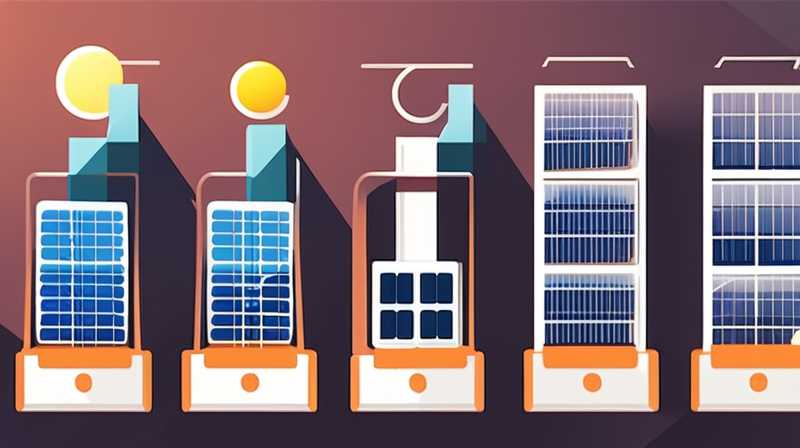
Inadequate sunlight exposure, malfunctioning components, improper installation, and environmental obstructions contribute to solar panels not generating electricity.
- INADEQUATE SUNLIGHT EXPOSURE,
Solar panels primarily depend on sunlight to generate electricity; therefore, insufficient exposure can significantly hinder their performance. Several conditions can lead to inadequate sunlight, such as geographical location, shading from trees, buildings, or other obstacles. For instance, areas with frequent overcast weather or high-altitude geographic locations tend to experience lower solar radiation, which could adversely affect solar energy output.
Additionally, the angle and orientation of solar panels are crucial factors in determining their efficiency. Panels should ideally be positioned to receive the most direct sunlight throughout the day. When incorrectly installed, panels may face away from the sun or be angled improperly, resulting in reduced electricity generation. Choosing the right installation site that maximizes exposure and diminishing obstructions plays a vital role in optimizing performance.
- MALFUNCTIONING COMPONENTS,
The integrity of various components within a solar panel system directly influences its functionality. Malfunctions can arise from various sources, including defective solar cells, faulty inverters, or wiring problems. Solar panels consist of multiple solar cells that convert sunlight into electricity; if one or more cells fail, it can compromise the entire panel’s output.
Inverters, which transform direct current (DC) into alternating current (AC) for household use, can also fail. A malfunctioning inverter may prevent electricity generation entirely, even if other components are functioning optimally. Regular inspections and maintenance of the installation can help identify and rectify component failures early, ensuring continued efficiency.
- IMPROPER INSTALLATION,
Installation practices play a critical role in the performance of solar photovoltaic systems. Understanding industry standards and guidelines is essential for effective installation. If panels are incorrectly mounted or misaligned, they will not capture sunlight effectively. For example, installing a system that does not account for seasonal sun variation can lead to suboptimal energy production.
Moreover, if the installation lacks proper electrical connections or compliance with local codes, it can contribute to energy loss or system failures. It is crucial to engage qualified professionals for installation to mitigate risks associated with poor workmanship, thereby enhancing the longevity and efficiency of the system.
- ENVIRONMENTAL OBSTRUCTIONS,
The functionality of solar panels can also be hindered by environmental factors that compromise their exposure to sunlight. Dust, debris, and environmental pollutants can accumulate on the surface of solar panels, reducing their ability to absorb sunlight effectively. Regular cleaning and maintenance are necessary to prevent debris buildup, especially in areas prone to dust or sand.
Additionally, seasonal changes bring different challenges, such as snow accumulation during winter months or persistent rain. While solar panels are designed to withstand various climatic conditions, heavy snow or excessive rainfall can significantly hinder their ability to produce electricity.
FAQs
HOW DO I KNOW IF MY SOLAR PANELS ARE FUNCTIONING PROPERLY?
To assess the functionality of solar panels, monitoring their energy output using a performance monitoring system is advisable. This system checks the energy produced against expected values, taking into account factors like geographical location and solar irradiance availability. If the output drastically deviates from anticipated figures, further investigation is warranted to determine potential issues with the system. Additionally, performance measures can be reviewed through the inverter’s display or dedicated smartphone apps provided by manufacturers. Regular checks, combined with visual inspections for debris accumulation or physical damages, can ensure that the system operates optimally.
WHAT MAINTENANCE DO SOLAR PANELS REQUIRE?
Maintenance requirements for solar panels are minimal but essential to maximize efficiency. It is vital to keep the panels clean from dust, dirt, and other environmental contaminants that may obstruct sunlight absorption. They should be inspected periodically to check for any physical damage and ensure that all connections are secure. In locations with heavy pollen or pollution, more frequent cleanings may be necessary. Some consumers may choose to hire professional cleaning services to ensure panels are kept in optimal condition. Regular checks will help address any potential concerns before they escalate into significant issues, preserving the investment in solar technology.
WHEN SHOULD I CALL A PROFESSIONAL TO INSPECT MY SOLAR PANELS?
If observing substantial discrepancies in expected solar output, or experiencing issues with energy generation, an immediate call to a professional is warranted. Other indicators for seeking professional assistance include visible component damage, unusual noises, or malfunctioning indicators on the inverter. Professional inspections are also beneficial after severe weather events, as sudden gusts, heavy rains, or hail may compromise the integrity of the installation. Regular scheduled maintenance by certified solar technicians can also enhance the longevity and efficiency of the system, providing peace of mind for solar panel owners.
The challenges surrounding solar panel performance are multifaceted and deeply interconnected. Factors such as inadequate sunlight exposure, malfunctions, installation quality, and environmental obstructions can all contribute to diminished electricity generation.
Understanding these elements allows for proactive solutions, such as ensuring proper installation, conducting regular maintenance, and choosing optimal locations for installations. With continuous advancements in solar technology and growing awareness of renewable energy sources, addressing these challenges is becoming increasingly essential for both homeowners and businesses alike.
Being equipped with the knowledge of how solar panels function and the common hindrances they face empowers individuals to take action. Having a clear assessment of their solar systems’ health and performance can lead to timely interventions. By embarking on routine inspections and engaging qualified professionals, solar panel owners can ensure enduring efficiency, enabling their systems to harness the full potential of solar energy.
Transitioning to renewable energy sources, such as solar, holds immense promise and benefits. The journey requires dedication and awareness of factors affecting system performance, which can dramatically influence energy generation. As energy demands continue rising, understanding and addressing these challenges can lead to better energy solutions, ultimately aiding in the global shift toward sustainable energy practices.
Original article by NenPower, If reposted, please credit the source: https://nenpower.com/blog/why-are-solar-panels-not-generating-electricity/


